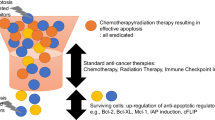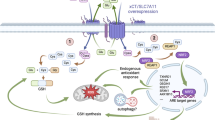Abstract
Background
Previously, it has been found that the cancer upregulated gene 2 (CUG2) and the epidermal growth factor receptor (EGFR) both contribute to drug resistance of cancer cells. Here, we explored whether CUG2 may exert its anticancer drug resistance by increasing the expression of EGFR.
Methods
EGFR expression was assessed using Western blotting, immunofluorescence and capacitance assays in A549 lung cancer and immortalized bronchial BEAS-2B cells, respectively, stably transfected with a CUG2 expression vector (A549-CUG2; BEAS-CUG2) or an empty control vector (A549-Vec; BEAS-Vec). After siRNA-mediated EGFR, Stat1 and HDAC4 silencing, antioxidant and multidrug resistance protein and mRNA levels were assessed using Western blotting and RT-PCR. In addition, the respective cells were treated with doxorubicin after which apoptosis and reactive oxygen species (ROS) levels were measured. Stat1 acetylation was assessed by immunoprecipitation.
Results
We found that exogenous CUG2 overexpression induced EGFR upregulation in A549 and BEAS-2B cells, whereas EGFR silencing sensitized these cells to doxorubicin-induced apoptosis. In addition, we found that exogenous CUG2 overexpression reduced the formation of ROS during doxorubicin treatment by enhancing the expression of antioxidant and multidrug resistant proteins such as MnSOD, Foxo1, Foxo4, MRP2 and BCRP, whereas EGFR silencing congruently increased the levels of ROS by decreasing the expression of these proteins. We also found that EGFR silencing and its concomitant Akt, ERK, JNK and p38 MAPK inhibition resulted in a decreased Stat1 phosphorylation and, thus, a decreased activation. Since also acetylation can affect Stat1 activation via a phospho-acetyl switch, HDAC inhibition may sensitize cells to doxorubicin-induced apoptosis. Interestingly, we found that exogenous CUG2 overexpression upregulated HDAC4, but not HDAC2 or HDAC3. Conversely, we found that HDAC4 silencing sensitized the cells to doxorubicin resistance by decreasing Stat1 phosphorylation and EGFR expression, thus indicating an interplay between HDAC4, Stat1 and EGFR.
Conclusion
Taken together, we conclude that CUG2-induced EGFR upregulation confers doxorubicin resistance to lung (cancer) cells through Stat1-HDAC4 signaling.







Similar content being viewed by others
References
S. Lee, J. Gang, S.B. Jeon, S.H. Choo, B. Lee, Y.G. Kim, Y.S. Lee, J. Jung, S.Y. Song, S.S. Koh, Molecular cloning and functional analysis of a novel oncogene, cancer-upregulated gene 2 (CUG2). Biochem Biophys Res Commun 360, 633–639 (2007)
T. Hori, M. Amano, A. Suzuki, C.B. Backer, J.P. Welburn, Y. Dong, B.F. McEwen, W.H. Shang, E. Suzuki, K. Okawa, I.M. Cheeseman, T. Fukagawa, CCAN makes multiple contacts with centromeric DNA to provide distinct pathways to the outer kinetochore. Cell 135, 1039–1052 (2008)
H. Kim, M. Lee, S. Lee, B. Park, W. Koh, D.J. Lee, D.S. Lim, S. Lee, Cancer-upregulated gene 2 (CUG2), a new component of centromere complex, is required for kinetochore function. Mol Cell 27, 697–701 (2009)
E.H. Park, I.R. Cho, R. Srisuttee, H.J. Min, M.J. Oh, Y.J. Jeong, B.H. Jhun, R.N. Johnston, S. Lee, S.S. Koh, Y.H. Chung, CUG2, a novel oncogene confers reoviral replication through Ras and p38 signaling pathway. Cancer Gene Ther 17, 307–314 (2010)
W. Malilas, S.S. Koh, R. Srisuttee, W. Boonying, I.R. Cho, C.S. Jeong, R.N. Johnston, Y.H. Chung, Cancer upregulated gene 2, a novel oncogene, confers resistance to oncolytic vesicular stomatitis virus through STAT1-OASL2 signaling. Cancer Gene Ther 20, 125–132 (2013)
W. Malilas, S.S. Koh, S. Kim, R. Srisuttee, I.R. Cho, J. Moon, H.S. Yoo, S. Oh, R.N. Johnston, Y.H. Chung, Cancer upregulated gene 2, a novel oncogene, enhances migration and drug resistance of colon cancer cells via STAT1 activation. Int J Oncol 43, 1111–1116 (2013)
S. Kaowinn, J. Kim, J. Lee, D.H. Shin, C.D. Kang, D.K. Kim, S. Lee, M.K. Kang, S.S. Koh, S.J. Kim, Y.H. Chung, Cancer upregulated gene 2 induces epithelial-mesenchymal transition of human lung cancer cells via TGF-beta signaling. Oncotarget 8, 5092–5110 (2017)
K.J. Wilson, J.L. Gilmore, J. Foley, M.A. Lemmon, D.J. Riese 2nd, Functional selectivity of EGF family peptide growth factors: Implications for cancer. Pharmacol Ther 122, 1–8 (2009)
N. Normanno, A. De Luca, C. Bianco, L. Strizzi, M. Mancino, M.R. Maiello, A. Carotenuto, G. De Feo, F. Caponigro, D.S. Salomon, Epidermal growth factor receptor (EGFR) signaling in cancer. Gene 366, 2–16 (2006)
M.A. Lemmon, J. Schlessinger, Cell signaling by receptor tyrosine kinases. Cell 141, 1117–1134 (2010)
Y. Zhen, L. Guanghui, Z. Xiefu, Knockdown of EGFR inhibits growth and invasion of gastric cancer cells. Cancer Gene Ther 21, 491–497 (2014)
Y. Yarden, M.X. Sliwkowski, Untangling the ErbB signalling network. Nat Rev Mol Cell Biol 2, 127–137 (2001)
R.J. Silva-Oliveira, V.A. Silva, O. Martinho, A. Cruvinel-Carloni, M.E. Melendez, M.N. Rosa, F.E. de Paula, L. de Souza Viana, A.L. Carvalho, R.M. Reis, Cytotoxicity of allitinib, an irreversible anti-EGFR agent, in a large panel of human cancer-derived cell lines: KRAS mutation status as a predictive biomarker. Cell Oncol 39, 253–263 (2016)
C. Gridelli, F. De Marinis, M. Di Maio, D. Cortinovis, F. Cappuzzo, T. Mok, Gefitinib as first-line treatment for patients with advanced non-small-cell lung cancer with activating epidermal growth factor receptor mutation: Review of the evidence. Lung Cancer 71, 249–257 (2011)
M. Murphy, B. Stordal, Erlotinib or gefitinib for the treatment of relapsed platinum pretreated non-small cell lung cancer and ovarian cancer: A systematic review. Drug Resist Updat 14, 177–190 (2011)
R. Bianco, T. Gelardi, V. Damiano, F. Ciardiello, G. Tortora, Rational bases for the development of EGFR inhibitors for cancer treatment. Int J Biochem Cell Biol 39, 1416–1431 (2007)
S.N. Bichev, D.M. Marinova, Y.G. Slavova, A.S. Savov, Epidermal growth factor receptor mutations in east European non-small cell lung cancer patients. Cell Oncol 38, 145–153 (2015)
Y.X. Bao, X.D. Zhao, H.B. Deng, C.L. Lu, Y. Guo, X. Lu, L.L. Deng, Schedule-dependent cytotoxicity of sunitinib and TRAIL in human non-small cell lung cancer cells with or without EGFR and KRAS mutations. Cell Oncol 39, 343–352 (2016)
M.J. Sotelo, B. Garcia-Paredes, C. Aguado, J. Sastre, E. Diaz-Rubio, Role of cetuximab in first-line treatment of metastatic colorectal cancer. World J Gastroenterol 20, 4208–4219 (2014)
J.E. Frampton, Cetuximab: A review of its use in squamous cell carcinoma of the head and neck. Drugs 70, 1987–2010 (2010)
X.J. Yang, E. Seto, HATs and HDACs: From structure, function and regulation to novel strategies for therapy and prevention. Oncogene 26, 5310–5318 (2007)
A. Ferraro, Altered primary chromatin structures and their implications in cancer development. Cell Oncol 39, 195–210 (2016)
H. Geng, C.T. Harvey, J. Pittsenbarger, Q. Liu, T.M. Beer, C. Xue, D.Z. Qian, HDAC4 protein regulates HIF1α protein lysine acetylation and cancer cell response to hypoxia. J Biol Chem 286, 38095–38102 (2011)
M.M. Mihaylova, D.S. Vasquez, K. Ravnskjaer, P.D. Denechaud, R.T. Yu, J.G. Alvarez, M. Downes, R.M. Evans, M. Montminy, R.J. Shaw, Class IIa histone deacetylases are hormone-activated regulators of FOXO and mammalian glucose homeostasis. Cell 145, 607–621 (2011)
E.A. Stronach, A. Alfraidi, N. Rama, C. Datler, J.B. Studd, R. Agarwal, T.G. Guney, C. Gourley, B.T. Hennessy, G.B. Mills, A. Mai, R. Brown, R. Dina, H. Gabra, HDAC4-regulated STAT1 activation mediates platinum resistance in ovarian cancer. Cancer Res 71, 4412–4422 (2011)
Y. Sun, Y.E. Chin, E. Weisiger, C. Malter, I. Tawara, T. Toubai, E. Gatza, P. Mascagni, C.A. Dinarello, P. Reddy, Cutting edge: Negative regulation of dendritic cells through acetylation of the nonhistone protein STAT-3. J Immunol 182, 5899–5903 (2009)
Z.L. Yuan, Y.J. Guan, D. Chatterjee, Y.E. Chin, Stat3 dimerization regulated by reversible acetylation of a single lysine residue. Science 307, 269–273 (2005)
Z.H. Kang, C.Y. Wang, W.L. Zhang, J.T. Zhang, C.H. Yuan, P.W. Zhao, Y.Y. Lin, S. Hong, C.Y. Li, L. Wang, Histone deacetylase HDAC4 promotes gastric cancer SGC-7901 cells progression via p21 repression. PLoS One 9, e98894 (2014)
A.J. Wilson, D.S. Byun, S. Nasser, L.B. Murray, K. Ayyanar, D. Arango, M. Figueroa, A. Melnick, G.D. Kao, L.H. Augenlicht, J.M. Mariadason, HDAC4 promotes growth of colon cancer cells via repression of p21. Mol Biol Cell 19, 4062–4075 (2008)
D.M. Shin, Y.C. Shin, J.H. Lee, T.H. Kim, D.W. Han, J.M. Kim, H.K. Kim, K. Kim, Y.H. Hwang, Highly sensitive detection of epidermal growth factor receptor expression levels using a capacitance sensor. Sensors Actuators B Chem 209, 438–443 (2015)
O.H. Kramer, T. Heinzel, Phosphorylation-acetylation switch in the regulation of STAT1 signaling. Mol Cell Endocrinol 315, 40–48 (2010)
S. Zhuang, Regulation of STAT signaling by acetylation. Cell Signal 25, 1924–1931 (2013)
D. Zhao, B. Zhai, C. He, G. Tan, X. Jiang, S. Pan, X. Dong, Z. Wei, L. Ma, H. Qiao, H. Jiang, X. Sun, Upregulation of HIF-2alpha induced by sorafenib contributes to the resistance by activating the TGF-alpha/EGFR pathway in hepatocellular carcinoma cells. Cell Signal 26, 1030–1039 (2014)
N. Ungerleider, C. Han, J. Zhang, L. Yao and T. Wu, TGFbeta signaling confers sorafenib resistance via induction of multiple RTKs in hepatocellular carcinoma cells. Mol Carcinog 56, 1302-1311 (2017)
R. Kurimoto, S. Iwasawa, T. Ebata, T. Ishiwata, I. Sekine, Y. Tada, K. Tatsumi, S. Koide, A. Iwama, Y. Takiguchi, Drug resistance originating from a TGF-beta/FGF-2-driven epithelial-to-mesenchymal transition and its reversion in human lung adenocarcinoma cell lines harboring an EGFR mutation. Int J Oncol 48, 1825–1836 (2016)
S.L. Yu, D.C. Lee, J.W. Son, C.G. Park, H.Y. Lee, J. Kang, Histone deacetylase 4 mediates SMAD family member 4 deacetylation and induces 5-fluorouracil resistance in breast cancer cells. Oncol Rep 30, 1293–1300 (2013)
N.N. Khodarev, P. Roach, S.P. Pitroda, D.W. Golden, M. Bhayani, M.Y. Shao, T.E. Darga, M.G. Beveridge, R.F. Sood, H.G. Sutton, M.A. Beckett, H.J. Mauceri, M.C. Posner, R.R. Weichselbaum, STAT1 pathway mediates amplification of metastatic potential and resistance to therapy. PLoS One 4, e5821 (2009)
D. Roberts, J. Schick, S. Conway, S. Biade, P.B. Laub, J.P. Stevenson, T.C. Hamilton, P.J. O'Dwyer, S.W. Johnson, Identification of genes associated with platinum drug sensitivity and resistance in human ovarian cancer cells. Br J Cancer 92, 1149–1158 (2005)
M. Fryknas, S. Dhar, F. Oberg, L. Rickardson, M. Rydaker, H. Goransson, M. Gustafsson, U. Pettersson, P. Nygren, R. Larsson, A. Isaksson, STAT1 signaling is associated with acquired crossresistance to doxorubicin and radiation in myeloma cell lines. Int J Cancer 120, 189–195 (2007)
L. Rickardson, M. Fryknas, S. Dhar, H. Lovborg, J. Gullbo, M. Rydaker, P. Nygren, M.G. Gustafsson, R. Larsson, A. Isaksson, Identification of molecular mechanisms for cellular drug resistance by combining drug activity and gene expression profiles. Br J Cancer 93, 483–492 (2005)
H.M. Chang, M. Paulson, M. Holko, C.M. Rice, B.R. Williams, I. Marie, D.E. Levy, Induction of interferon-stimulated gene expression and antiviral responses require protein deacetylase activity. Proc Natl Acad Sci U S A 101, 9578–9583 (2004)
L. Klampfer, J. Huang, L.A. Swaby, L. Augenlicht, Requirement of histone deacetylase activity for signaling by STAT1. J Biol Chem 279, 30358–30368 (2004)
J. Vlasakova, Z. Novakova, L. Rossmeislova, M. Kahle, P. Hozak, Z. Hodny, Histone deacetylase inhibitors suppress IFNalpha-induced up-regulation of promyelocytic leukemia protein. Blood 109, 1373–1380 (2007)
I. Nusinzon, C.M. Horvath, Interferon-stimulated transcription and innate antiviral immunity require deacetylase activity and histone deacetylase 1. Proc Natl Acad Sci U S A 100, 14742–14747 (2003)
Acknowledgements
This study was supported by the Basic Research Program of the National Research Foundation, funded by the Korean government (NRF-2014R A1A2053750), (MSIP) (NRF- 2015R1A2A1A15056030), and (2015R1A5A7036513).
Author information
Authors and Affiliations
Contributions
S.K., R.N. J. and Y-H.C. conceived and designed the experiments. S.K., S.W.J., D.-M.S., C.K. and H.H.J. performed the experiments. Y.-H. H., K.K., B.S., C.S.K., S.S.K. and O.H.K contributed reagents and materials. S.K., R.N. J. and Y-H.C. wrote the paper.
Corresponding author
Ethics declarations
Conflicts of interest
The authors declare no competing interest.
Electronic supplementary material
ESM 1
(DOCX 3311 kb)
Rights and permissions
About this article
Cite this article
Kaowinn, S., Jun, S.W., Kim, C.S. et al. Increased EGFR expression induced by a novel oncogene, CUG2, confers resistance to doxorubicin through Stat1-HDAC4 signaling. Cell Oncol. 40, 549–561 (2017). https://doi.org/10.1007/s13402-017-0343-7
Accepted:
Published:
Issue Date:
DOI: https://doi.org/10.1007/s13402-017-0343-7




